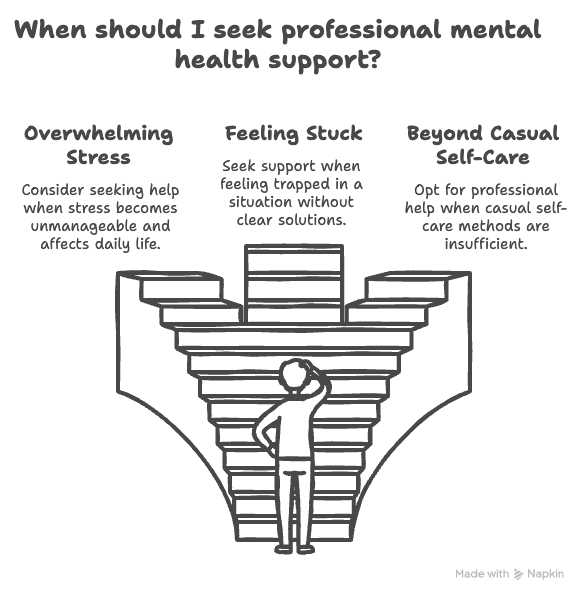
The Modern Work-Stress–Weight Spiral
Welcome to 2025—where your work calendar has more color coding than your fridge, Slack pings follow you into the shower, and “rest” means scrolling TikTok while half-asleep. We’re working harder, thinking faster, and somehow still feeling like we’re falling behind. And the stress? It’s stacking up, not just in our inboxes but around our waistlines too. The result is a storm of work stress and weight gain.
Honestly? Gaining weight from stress isn’t about being lazy or lacking willpower—it’s your body reacting to overload. It’s biology, behavior, and burnout—all doing a number on your body. The good news? You’re not doomed to live in stretchy pants forever. With the right approach, you can tame the stress monster, ditch the weight creep, and reclaim your energy—without losing your damn mind.
SECTION 1: Why Work Stress is Making You Gain Weight (It’s Not Just in Your Head)
1.1 Cortisol is the Culprit
When your boss drops a last-minute project at 4:59 PM, your body doesn’t just get annoyed—it goes full DEFCON-1. Stress triggers the release of cortisol, your body’s “fight-or-flight” hormone. Back in caveman days, it helped us outrun wild animals. In 2025? It mostly helps us stress-eat cookies and store fat—especially around the belly.
Cortisol jacks up your appetite, messes with your blood sugar, and makes you crave high-fat, high-sugar “comfort” foods. Even worse? It tells your body to hold on to fat, just in case another “emergency” (aka Zoom call) pops up.
1.2 Cravings, Comfort Food, and Emotional Eating
You’re not weak for reaching for snacks after a stressful call—you’re wired that way. Stress hijacks your brain’s reward center, making you crave sugary, salty, carb-loaded comfort food. And if you skipped lunch because of back-to-back meetings? That 4pm donut isn’t just a craving—it’s your body panicking and playing catch-up.
This rollercoaster of restriction → craving → binge isn’t just unhelpful—it’s exhausting. The key is getting ahead of the stress-eat loop before it starts. More on that soon.
1.3 Skipped Workouts & Burnout Bodies
After a full day of mental gymnastics, dragging yourself to the gym feels like climbing Everest. Chronic stress drains motivation, saps energy, and turns even a 10-minute walk into a monumental task. It’s not laziness—it’s survival mode.
When your nervous system is constantly lit up like a Christmas tree, your body prioritizes short-term survival (hello, cortisol again) over long-term health goals like fitness. Translation: your body’s just trying to get through the day—not burn calories or build muscle.
1.4 Sleep Takes a Hit
And then there’s sleep—sweet, essential, totally elusive. Stress can make your mind race at night, keeping you up replaying awkward work convos or tomorrow’s to-do list. Less sleep means a hungrier, crankier, slower-metabolizing version of you the next day.
Sleep loss increases ghrelin (your hunger hormone) and decreases leptin (your fullness cue), leading to carb cravings and energy crashes. One bad night? No big deal. Chronic sleep deprivation? A recipe for weight gain that no diet can fix.
SECTION 2: Slay the Stress, Drop the Weight—Without Losing It Mentally
You don’t need a full life overhaul to stop the work stress weight gain spiral—you just need a better system. This section is your toolkit to feel better, eat smarter, and move your body without adding more chaos to your calendar.
2.1 Mind Your Mind: Stress Management That Works
Before you hit the weights or tweak your macros, start with what’s going on upstairs.
- Meditation, breathwork, and yoga aren’t just wellness buzzwords—they’re science-backed ways to lower cortisol, reset your nervous system, and get out of panic mode. Even five minutes can shift your whole day.
- Navigating workplace conflict with calm and clarity can reduce tension that lingers far beyond the office. Whether it’s setting boundaries with your boss or clearing the air with a teammate, less drama = less stress.
- Set expectations—and stick to them. Saying “no” doesn’t make you difficult; it makes you sane. Boundaries aren’t walls, they’re filters. Protect your time, your energy, and your peace.
2.2 Eat Like You Give a Damn
You’re not a robot—you’re a human with cravings, emotions, and deadlines. Your eating habits should reflect that.
- Mindful eating means paying attention, not perfection. Slow down, chew your food, and actually taste what you’re eating. Your brain needs a minute to catch up to your stomach.
- Skipping meals? Big mistake. Your metabolism isn’t a fan of famine. It needs consistency to work properly—and when it’s running low, you’re more likely to overeat later (hello, 9pm fridge raid).
- Hydration is low-key stress relief. Being dehydrated messes with your mood, energy, and even hunger cues. Aim for regular sips all day, not a chug-a-thon at night.
2.3 Move More, Stress Less
You don’t need a 90-minute gym sesh to change your brain chemistry. Just move.
- Daily movement helps regulate cortisol, improve sleep, and boost endorphins—your body’s built-in stress buffer.
- Not every workout has to be a beast. Micro workouts (like a brisk 10-minute walk or a few sets of squats between meetings) count too. In 2025, it’s not about more—it’s about better.
2.4 Master the Clock, Reclaim Your Sanity
Time is a tool—not a tyrant. Here’s how to use it well.
- The Pomodoro Technique (25 minutes of work, 5-minute break) keeps you focused and grounded. It’s like interval training for your brain.
- Task triage is your best friend. Not everything needs to happen today. Ask: What’s urgent? What’s important? What can wait?
- Do less—but do it better. Multitasking is a myth. Streamline, simplify, and give your energy to what actually moves the needle.
This is how you win the long game: a calm mind, consistent habits, and workouts that work for your life—not against it.
SECTION 3: Don’t Do It Alone—Build Your Support Network

3.1 Lean on Your People
Let’s kill the myth of the solo stress warrior. You don’t need to white-knuckle your way through every meltdown. Talking it out—whether it’s with your best friend, your coworker who gets it, or your mom who thinks “take a nap” solves everything—actually rewires your brain. Venting isn’t weak; it’s regulation.
Stress thrives in isolation, but connection short-circuits it. A five-minute chat, a walk with a friend, or just sending a “work sucks today” text can be enough to break the work stress and weight gain spiral. Community isn’t just comforting—it’s healing. And no, you don’t need a 12-person support group. Even one real connection can shift everything.
3.2 When It’s Bigger Than You

Sometimes, though, the weight you’re carrying goes beyond what a coffee date can fix. That’s when it’s time to tag in a pro. Therapists, coaches or counsellors aren’t just for “rock bottom” moments—they’re for any moment when you feel stuck, overwhelmed, or like your stress is managing you instead of the other way around.
Mental health is health. Full stop. If your job, body image, or burnout are stealing your joy or messing with your self-worth, don’t wait. Get help. You deserve to feel better—and yes, you can.
Section 4: Your Go-To Resources
The insights in this article were drawn from trusted sources in fitness education, career guidance, and health publishing. For further reading or to explore these topics in more depth, check out the full list below:
https://www.healthline.com/health-news/how-burnout-at-work-may-be-causing-you-to-gain-weight
https://www.verywellmind.com/how-stress-can-cause-weight-gain-3145088
https://health.clevelandclinic.org/stress-and-weight-gain
https://www.betterup.com/blog/stress-management-techniques
https://www.helpguide.org/mental-health/stress/stress-management
https://www.cofitness.com.ph/blog/stress-and-weight-gain-break-the-cycle-with-co-fitness
Bookmark these. Share them. Return to them when stress sneaks in again (because it will). The goal isn’t to live stress-free—it’s to live stress-resilient.
Conclusion: Your Mind Matters as Much as Your Meals
Stress weight gain isn’t about weakness, it’s about wiring. The modern workplace is a pressure cooker, but you don’t have to let it boil over into your body.
Let’s recap the real game plan:
- Manage the stress before it manages you. Breathwork, boundaries, and better time blocks are your allies.
- Eat mindfully, not reactively. Skipping meals and bingeing later is a trap—fuel your body like you value it.
- Move your body, even in short bursts. Every step counts when you’re breaking the burnout loop.
- Ask for help, whether it’s a friend, a coach, or a therapist. You don’t have to carry this alone.
You deserve a body—and a mind—that feel strong, calm, and supported.
Your job might be stressful, but your body doesn’t have to pay the price.
Now go reclaim your peace—and your pants that don’t stretch.
If you’re reading this thinking, “Wow, that’s me”—tired, overwhelmed, stress-eating through deadlines, and watching the scale slowly creep up—you’re not alone. And more importantly? You’re not stuck.
And yes, we believe fitness should challenge you. But it should also support you, empower you, and help you feel good in your own skin again.
This isn’t just about sweat—it’s about stress management with muscle, and building a body that can carry you through your toughest seasons.
SoFit Personal Training & Nutrition



